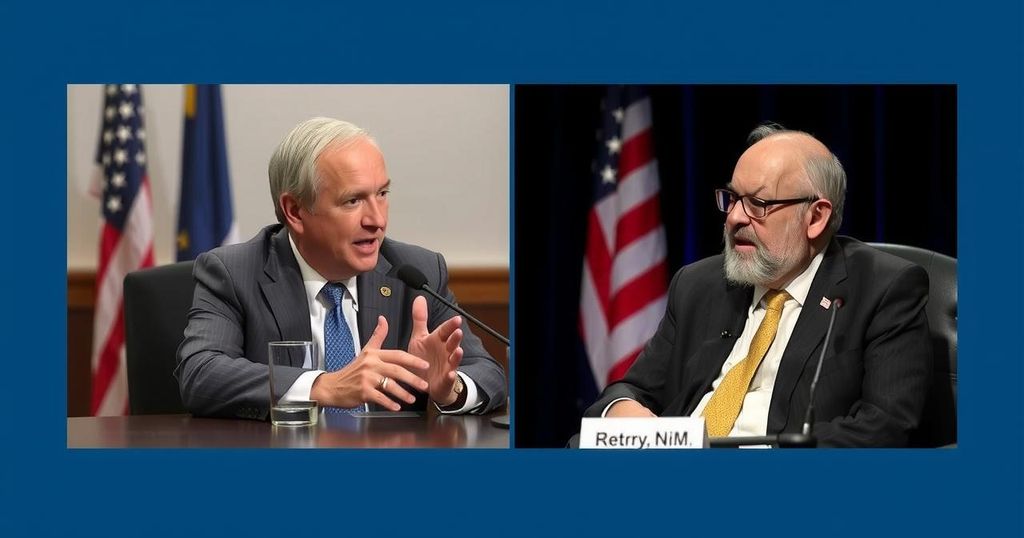Former US State Department adviser Hazem Alghabra argues that Israel should extend a message of peace towards Syria to counter extremism, emphasizing its emerging status as a regional superpower. Alghabra suggests that Israel’s focus should shift from mere defense to constructive engagement, fostering economic ties with Syria to promote stability. The discussion highlights the importance of a nuanced diplomatic approach in light of changing political dynamics within Syria.
Hazem Alghabra, a former senior US State Department adviser, articulated the need for Israel to foster a message of peace towards Syria, rather than creating further alienation. Speaking at a roundtable discussion organized by The Jerusalem Center for Security and Foreign Affairs, Alghabra expressed that encouraging peaceful relations could help counteract extremist ideologies within the Syrian population, particularly in the context of the recent fall of the Assad regime.
Alghabra emphasized that Israel currently does not face a military threat from the Golan Heights, calling the Druze-controlled regions a “friendly-ish” buffer. He noted Israel’s emergence as a regional superpower following the October 7 attacks and explained that neither Turkey nor Iran wishes to engage in direct conflicts with it. He asserted that this position obliges Israel to engage actively with Syria as a potential economic partner. By focusing on constructing positive relations rather than solely repelling armies, Israel could pave the way for fruitful collaboration, particularly in sectors like irrigation.
Instead of labeling groups like Hayat Tahrir Al-Sham as terrorists, Alghabra advocated for a more constructive narrative to promote peace from a position of strength. He cited historical examples of victor’s peace, drawing parallels to the post-Civil War United States, wherein the victorious North extended mercy to the South, ultimately leading to national consolidation. Alghabra stressed that peace is a prolonged process and underlined Israel’s role in initiating dialogue while offering economic opportunities to the Syrian population. Although acknowledging the Islamist inclinations of new Syrian leaders, he proposed that Israel adopt a proactive stance by signaling readiness for cooperation and recognition.
Dan Diker, president of JCFA, echoed Alghabra’s sentiments, stating Israel ought to leverage its regional strength to build better relationships with its neighbors. Diker pointed out that past traumas should inform Israel’s current diplomatic strategy, encouraging nationwide respect and honor in response to external overtures. Yossi Kuperwasser, speaking on Syria’s evolution, emphasized the instability stemming from the fragmented control within the region, notably highlighting the difficulties that a new Syrian leadership faces amidst diverse local sentiments.
Prof. Christian Kaunert added a European perspective, noting that reactions to the Assad regime’s fall reflect a change in expectations regarding democracy in the region and caution against alignments with disreputable factions.
In recent years, the geopolitical dynamics in the Middle East have shifted significantly, especially following the decline of established regimes such as that of Bashar al-Assad in Syria. This evolving political landscape has raised new considerations regarding Israel’s role and strategy in the region. Former US State Department adviser Hazem Alghabra posits that as Israel emerges as a regional superpower, it is crucial for Israeli leaders to engage constructively with a changing Syrian landscape to foster peace and counter extremism. The aftermath of the October 7 events has redefined regional power balances, leading to discussions on Israel’s potential diplomatic and economic influence within Syria. Alghabra’s insights challenge traditional narratives, advocating for a strategic approach that sees peace initiatives as foundational to long-term regional stability. The dialogue also revolves around the implications of new leaders within Syria, some with extremist backgrounds, and the necessary diplomatic balance to navigate these complexities.
In summary, Hazem Alghabra’s recommendations underscore the importance of Israel adopting a peace-oriented strategy towards Syria, particularly in light of its evolving status as a regional superpower. By extending olive branches instead of antagonism, Israel can cultivate favorable relations that may mitigate extremist sentiments and encourage economic collaboration. This approach, informed by historical precedents, advocates for a nuanced understanding of Syria’s diverse leadership landscape and the opportunities that peace can afford. Thus, a proactive and constructive Israeli engagement is imperative for achieving lasting stability in the region.
Original Source: www.jpost.com







